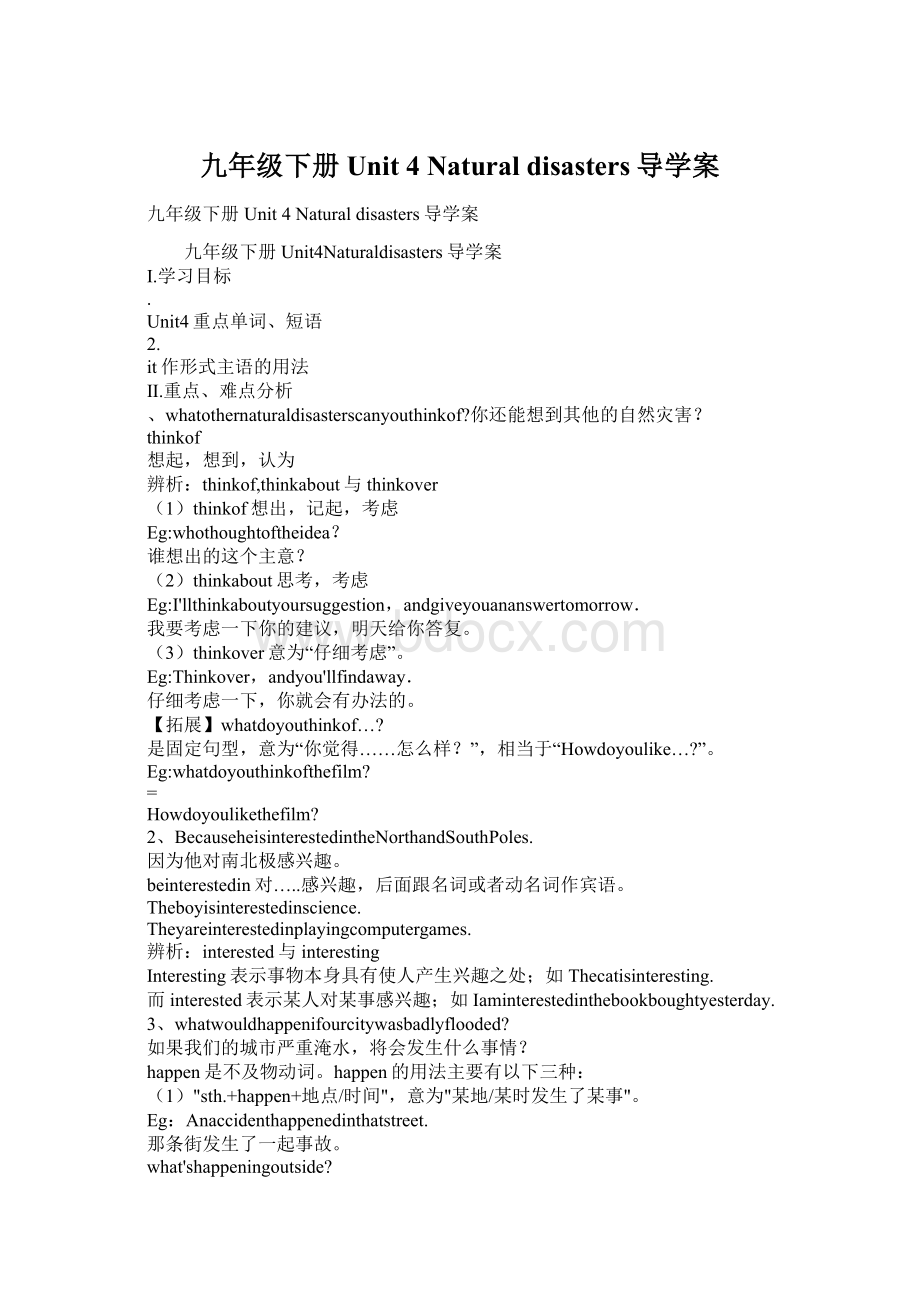九年级下册Unit 4 Natural disasters导学案Word下载.docx
《九年级下册Unit 4 Natural disasters导学案Word下载.docx》由会员分享,可在线阅读,更多相关《九年级下册Unit 4 Natural disasters导学案Word下载.docx(6页珍藏版)》请在冰豆网上搜索。

”,相当于“Howdoyoulike…?
”。
whatdoyouthinkofthefilm?
=
Howdoyoulikethefilm?
2、BecauseheisinterestedintheNorthandSouthPoles.
因为他对南北极感兴趣。
beinterestedin对…..感兴趣,后面跟名词或者动名词作宾语。
Theboyisinterestedinscience.
Theyareinterestedinplayingcomputergames.
interested与interesting
Interesting表示事物本身具有使人产生兴趣之处;
如Thecatisinteresting.
而interested表示某人对某事感兴趣;
如Iaminterestedinthebookboughtyesterday.
3、whatwouldhappenifourcitywasbadlyflooded?
如果我们的城市严重淹水,将会发生什么事情?
happen是不及物动词。
happen的用法主要有以下三种:
(1)"
sth.+happen+地点/时间"
,意为"
某地/某时发生了某事"
。
Eg:
Anaccidenthappenedinthatstreet.
那条街发生了一起事故。
what'
shappeningoutside?
外面发生什么事了?
(2)"
sth.+happento+sb."
意为"
某人出了某事"
Acaraccidenthappenedtohimyesterday.
昨天他发生了交通事故。
whathappenedtoyou?
你怎么啦?
(3)"
sb.+happen+todosth."
某人碰巧做某事"
;
或者”Ithappens+that从句”,意为“碰巧…..”
Ihappenedtomeetherinthestreet.
我碰巧在街上遇见她。
IthappenedthatIwasoutwhenhecalled.
他来访时我碰巧不在。
happen与takeplace
).takeplace表示“发生、举行、举办”,一般指非偶然性事件的“发生”,即这种事件的发生一定有某种原因或事先的安排。
Greatchangeshavetakenplaceinourhometownduringthepasttenyears.
TheolympicGamesofXXwilltakeplaceinBeijing.
2).happen作“发生、碰巧”解,一般用于偶然或突发性事件。
whathappenedtoyou?
Ihappenedtoseehimonmywayhome.=IthappenedthatIsawhimonmywayhome.
4、wouldanyoneremainalive?
还有人活着吗?
(1)remain此处作连系动词,意为“一直保持;
仍然处于某种状态”,后面可接形容词、名词、动名词ing形式、动词ed形式或介词短语。
whateverachievementsyou’vemade,youshouldremainmodest.无论你取得多么大的成就,你都该保持谦虚。
【拓展】remainstay都指“继续停留”或“继续保持某种状态、关系或行动。
”remain常可与stay互换。
)表示“继续呆在某处”时,应该用不及物动词remain或stay
ShallIgoorstay?
Heremainedinhisseatafteralltheotherstudentshadgonehome.
2)表示“继续保持或处于原来的状态”时,可用remain或stay
Thedoorstayedclosed.
3)表示“暂住、短期停留”时,只能用不及物动词stay
HeisstayingatHiltonHotel.
4)表示“残留、剩下”时,只能用不及物动词remain
Notmuchofthehouseremainedafterthefire.
5)remain强调“继续停留于一处或保持原状态、情况性质而不改变”,stay强调“某人[物]继续留在原地而不离开
Thisplaceremainscoolallsummer.
Hestayedtoseetheendofthegame.
(2)alive形容词,意为“活着的,在世的”。
Istheoldmanalivenow?
【注意】alive和living都可以表示“活着的”,但alive通常作表语或后置定语;
而living修饰人或者物时需要前置。
Alllivingthingsneedair.
5、Itcoveredroads,parksandsmallhouses.
水淹没了道路、公园和小房子。
cover此处用作及物动词,意为“覆盖;
盖上”,常与介词with搭配。
cover…with…意为“用……把……盖住”(表示动作)
becoveredwith...意为“被……覆盖”(表示状态)
Pleasecoverthetablewithawhitecloth.
Thehillsarecoveredwithtrees.
【拓展】cover还可以用作名词,意为“覆盖物;
封面等”
Thebookneedsanewcover.
6、Largeobjects,suchascoachesandboats,passedbymywindow.
大件的物体,例如汽车和轮船,从窗前经过。
passby意为“通过;
经过”;
还可以表示“(时间)逝去;
过去”。
Iseethempassbymyhouseeveryday.
Threeyearshadpassedbybeforeshefinallyfoundasuitablejob.
7、Ihadtodosomething.
我必须做点什么!
haveto与must
(1)must多表示主观需要或责任感的驱使有必要或有义务去做某事,多译为“必须”,而haveto多表示客观存在的环境所限,即客观要求而为之,多译为“不得不干某事”。
Imustcleantheroombecausetherearetoodirty.(无人强迫)因为太脏了,我必须要打扫房间。
wemustbethereontime.(责任感的驱使)我们一定准时到达。
Ihavetodomyhomeworknow.(不得不做)我现在不得不做作业。
Ihavetoleaveschoolbecausemyfamilyispoornow.(无奈)因为家里穷了,我不得不退学。
(2)must没有时态的变化,而haveto有时态的变化。
Damingwashurt.Thedoctorsaidhehadtostayinhospitalforabouttwoweeks.His
fatherhastogototakecareofhim.
wedon’thavetogotoschoolonSundays.星期天我们不必上学。
(3)must的否定为mustnt,多表示“禁令”。
No!
youmustntturnleft!
youmustturnrightintoTheStrand.
不!
你不能向左转!
你应该向右转进入到strand中。
由must引起的疑问句,肯定回答要用must或haveto,否定回答要用needn’t或don’thaveto,意思是“不必”;
此用法在中考中的单选题中容易出现!
1)—mustIfinishmyhomeworkbeforeeighto’clock?
我必须要在8点之前完成作业吗?
—yes,youmust.
是的,必须。
2)—mustIattendthemeeting?
我必须要参加这次会议吗?
—No,youneedn’t/don’thaveto.youcanaskTomtogoinstead.
不,你不必。
你可以让汤姆替你去。
7、Itriedtocallmydad,butthelinewasdead.
我试图给我爸爸打电话,但是电话线路不通。
(1)trytodosth.意为“试图/努力做某事”,侧重尽力,为了达到目的而努力;
否定形式为trynottodosth.
I’mtryingtolearnEnglishwell.
(2)trydoingsth.意为“试着/尝试做某事”,只是一种新的尝试,不一定付出很大的努力。
Let’stryknockingatthebackdoor.
【拓展】
)tryone’sbesttodosth.意为“尽某人最大努力做某事”
weshouldtryourbesttopracticespeakingEnglish.
2)tryon意为“试穿”
canItryinon?
3)try作可数名词,意为“尝试”,常构成haveatry,意为“试一试”
Ican’topenthedoor.willIhaveatry?
8、It’simpossibletostickwithit.
坚持工作很重要。
(1)It’s+形容词+forsb.+todosth.意为“对某人来说做某事时……的”
It’s+形容词+ofsb.+todosth.意为“某人做某事是…..的“,此句式中的形容词是描述人的性格、品质的,如:
polite,nice,kind,good,friendly等。
此句式也可以改为Sb.+be+形容词+todosth.
It’shardformetoansweryourquestions.
Itwasfoolishofhimtogoalone.=Hewasfoolishtogoalone.
(2)stickwith意为“持续;
坚持;
不放弃”;
还可以表示“紧接;
不离开;
和……呆在一起”
Stickwithyourschedulefortheweek.
Stickwiththem.There’ssafetyinnumbers.
9、myfriendsreplied,”Ihavenotimetodrinkabouttheflood…”
我的朋友说:
“我没有时间考虑洪水…..”
reply与answer
(1)两者均可表示“回答”,但answer属常用词,多用于一般性应答,而reply则较正式,多指经过考虑而作出答复。
IwassonervousthatIcouldn’tanswer[reply].
我紧张得没作回答。
(2)answer可自由地用作及物或不及物动词,而reply除后接that从句或引出直接引语是及物动词外,一般只用作不及物动词。
其后若接名词或代词作宾语,应借助介词to。
Herepliedthathehadchangedhismind.
他回答说他改变了主意。
Hedidn’tanswer[replyto]myquestion.他没有回答我的问题。
比较下面两句:
Hedidnotknowwhattoreply.
他不知道回答什么。
Hedidnotknowwhattoreplyto.他不知道回答什么问题。
(3)answer除表示“回答”外,还可表示接听或对门铃等声响作出反应等。
但reply不能这样用。
whoansweredthetelephone?
谁接的电话?
Alittlegirlansweredthedoor.一个小女孩应声去开门。
Nobodyansweredmycallforhelp.没有人理会我的呼救。
(4)两者除用作动词外,都可用作名词。
要表示“对……的回答”等,其后均接介词to。
Haveyouhadananswertoyourletter?
你寄出的信有回音没有?
Ireceivednoreplytomyrequest.
我的要求没有收到任何答复。
0、Insurprisepeoplefinallystartedtonoticetheflood,butitwastoolate.
最后人们惊讶地开始注意到洪水,但是已经太晚了。
insurprise
惊讶地
toone’ssurprise令人吃惊的是
【拓展】noticesb.doingsth.注意到某个人正在做某事;
noticesb.dosth.
注意到某人做了某事
我注意到她正在房间里哭。
___________________________________
我注意到她在房间里哭。
_____________________________________
0、mycomputerisdead,soIwillhavetobuyanewone.
我的电脑不运转了,所以我必须买一台新的。
one,it,that
it指代的是同类同物,that指代的是同类异物,one指的是上下文中提到的同类事物中的一个。
①I'
mlookingforaflat.I'
dreallylikeonewithagarden.
②-wheredidyoufindyourwatch?
-Ifinditinourclassroom.
③Thepopulationofchinaislargerthanthatofanyothercountry.
1、Theboywassoquietthatoftennoonewouldnoticewhenhecameintheroom.
那个男孩如此安静,以至于当他进入房间时经常没有人会注意到。
So…that
意为“如此……以至于”,引导结果状语从句,so后接形容词或副词。
Heissuchacleverboythateverybodylikeshim.
【拓展】在so…that结构中,若that从句的主语一致,在否定句中可与too…to…或not…enoughto…结构互换。
Heissoyoungthathecan’tjointhearmy.
=Heistooyoungtojointhearmy.
=Heisn’toldenoughtojointhearmy.
2、whatawfulweather!
多糟糕的天气啊!
(1)what++adj.+n.+主语+谓语+.
whataclevergirlsheis!
(2)How+adj.(adv.)+主语+谓语+.
Howcolditistoday!
3、Thegovernmentaskedpeopletoleaveforhigherground…
leavefor
动身去……;
启程去……
昨天他们动身去北京。
(1)leave可用作及物或不及物动词,意为“离开。
出发。
”常用于短语,意为“动身,出发”
HeleftPairsforNewyork.
(2)leave属非延续性动词,它不能和表示一段时间的词连用,如果要表示离开一段时间,要用beaway来代替。
Ihavebeenawayforaweek.
(3)leave用作名词时,可以表达多种含义,如“休假。
假期,许可,同意”
Ihadatwoweekleave.
(4)takeleaveof=takeone’sleave意为“向…
告别”
Hetookhisleaveandwenthome.
4、Barrysuggestedputtingfood,waterandmedicineinadisastersurvivalkit.
巴里建议把食物、水和药品放进一个灾难救生包里。
(1)suggest后接名词、代词或动词-ing形式,但不接动词不定式。
Hesuggestedgoingbyplane,butIthoughtitwouldcosttoomuch.
(2)suggestsb.todosth.
向某人建议某事
whatdidyousuggesttothemanager?
(3)suggest表“建议”,其后接that引导的宾语从句时,从句要用虚拟语气,即“主语(+should)+动词原形”
Isuggest(that)we(should)holdameeting.
5、Intheend,theasteroiddidnothittheEarth.
最后,小行星没有撞击地球。
intheend,finally,atlast
(1)intheend意为“终于”“最后”,表示经过许多变化、周折或捉摸不定的情况后发生了某事,也许是期待中的情况,也许是非期待中的情况。
还可以表示一种推测。
Heworkedhard,andintheendhesucceeded.
(2)atlast仅仅用于表示经过周折、等待或努力出现所期待的结果,不用于出现非期待的结果。
mysonisathomeintheend/atlast.
(3)finally既可用于表示时间位置,相当于intheend,也可以用于表示时间的先后顺序,如同first,second,next,then,last,lastly等词的用法。
Finally,I’dliketothankyouallforcoming.